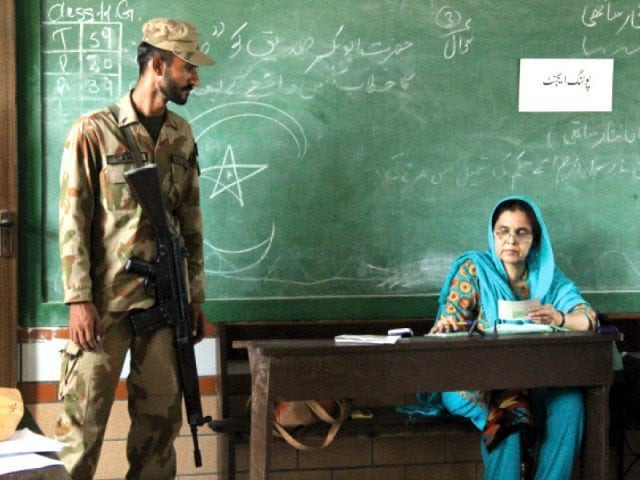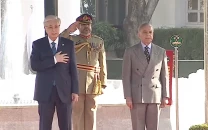ECP limits powers of military personnel after Senate drubbing
Polls body strongly rebuts comments of senators about ECP

The appointment of 371,000 armed forces personnel in elections with magisterial powers were criticised by and large while Senators also on Saturday expressed serious reservations over such powers. PHOTO: EXPRESS/FILE (2013 by-polls)
On July 10, the ECP had issued a notification, assigning broad powers to military personnel to be deployed at polling stations across the country between July 23 and July 27 “for the provision of a secure environment to assist ECP in the conduct of for free, fair and transparent manner.”
The act of assigning magisterial powers to 371,000 military personnel during the election was widely criticised.
On Saturday, a number of senators expressed serious reservations over such powers.
Citing its July 10 notification, ECP’s latest notification stated: “In respect of offences punishable under Sections 174, 176, 177, 183 and 194 of the aforesaid act shall be constituted with the words in respect of offences under Section 169 (personation) and Section 171 (capturing a polling station or polling booth) punishable under Section 174 of the aforesaid act.”
ECP’s amended notification cited the Elections Act of 2017, reversing several powers, including assigning magisterial powers in only two instances.
Caretakers, ECP come under fire in Senate
This includes personation -- a legal term for voter impersonation --as defined in Section 169. “A person is guilty of personation if he votes or applies for a ballot paper for voting, as some other person whether that other person is living or dead or fictitious.”
Similarly, Section 171 refers to capturing a polling station, or booth in addition to stopping voters from entering the polling station.
And both of these offences will be punishable under Section 174 that states that any person guilty of an offence of corrupt practices shall be punished with imprisonment for a term which may extend to three years or with fine which may extend to Rs100,000 or with both.
Other powers of Section 176, including awarding punishment for disorderly conduct near a polling station, and authority under Section 177 -- if a person canvases or solicits voters within a radius of 400 metres of the polling station -- have been withdrawn.
Similarly, under Section 183, if a person guilty of the offence of illegal practice shall be punishable with an imprisonment term which may extend to two years or with a fine which may extend to Rs100,000 or both, stands withdrawn.
These powers now rest with the presiding officer.
If the army personnel see any such offence, they will first inform the presiding officer and if the latter does not act to prevent the irregularity, the security staff will bring the matter to the notice of the designated officer-in-charge of Pakistan’s armed, civil forces.
Above all, policing powers assigned under Section 194 to the army personnel has also been withdrawn. This allows the authorities concerned to arrest any person without a warrant if that person commits an offence inside the polling station.
ECP will take action against party terror suspects
ECP punches back
Later in the evening, the ECP issued a detailed press statement, taking strong exception to comments and criticism of senators, terming it to be based on disinformation.
It further clarified that all security personnel deployed in and outside polling stations are supposed to first report to presiding officers about any irregularity or malpractice.
“The commission expresses serious reservations about statements made and the impression created in the house (Senate) about (an) independent constitutional entity which is working with complete freedom and impartiality.”
Replies by politicians in foul language case rejected by ECP
According to the ECP statement, interference in the domain of legal authorities “is tenable neither legally nor morally and such … allegations at a constitutional (institution) will not serve the democratic principle”.
This, it stated, was for the very first time that security personnel would be performing duties under a notified code of conduct and while under oath.



















COMMENTS
Comments are moderated and generally will be posted if they are on-topic and not abusive.
For more information, please see our Comments FAQ